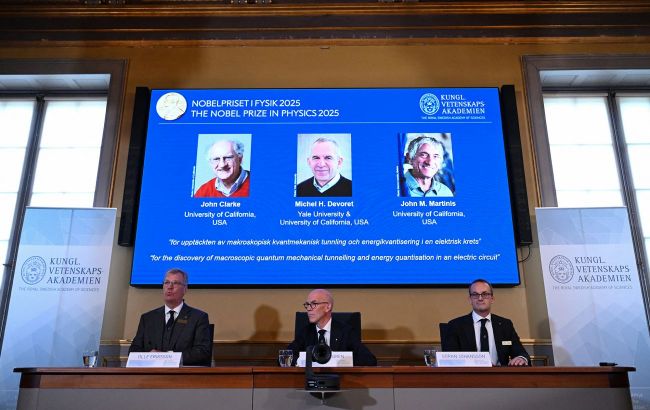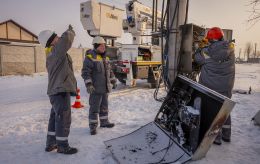Quantum leap: Three scientists win 2025 Nobel Prize in Physics
 Photo: Nobel Prize 2025 laureates in physics announced (Getty Images)
Photo: Nobel Prize 2025 laureates in physics announced (Getty Images)
The Nobel Committee on Tuesday, October 7, announced the laureates of the Nobel Prize in Physics. According to the press service of the Nobel Foundation, the award went to three scientists: John Clarke, Michel Devoret, and John Martinis.
They were awarded the Nobel Prize "for the discovery of macroscopic quantum mechanical tunnelling and energy quantisation in an electric circuit."
This year's physics laureates conducted experiments with an electrical circuit, demonstrating both the quantum tunneling effect and quantized energy levels in a system large enough to hold in one's hand.
Quantum mechanics allows a particle to move directly through a barrier through a process called tunneling.
When a large number of particles are involved, quantum mechanical effects usually become negligible. The laureates' experiments demonstrated that quantum mechanical properties can manifest at a macroscopic scale.
In 1984 and 1985, John Clarke, Michel Devoret, and John Martinis conducted a series of experiments with an electronic circuit built from superconductors, components that can conduct current without electrical resistance.
By refining and measuring all the different properties of their circuit, they were able to control and study phenomena that occurred as current passed through it. Together, the charged particles moving through the superconductor formed a system that behaved as if it were a single particle filling the entire circuit.
This macroscopic particle-like system initially exists in a state where current flows without voltage. The system is "stuck" in this state, as if behind a barrier it cannot cross. In the experiment, the system demonstrates its quantum nature by escaping the zero-voltage state through tunneling. The change in the system’s state is observed as the appearance of voltage.
The laureates also demonstrated that the system behaves as predicted by quantum mechanics: it is quantized, absorbing or emitting only specific amounts of energy.
Transistors in computer microchips are an example of established quantum technology that surrounds us.
This year's Nobel Prize in Physics opens possibilities for the next generation of quantum technology, including quantum cryptography, quantum computers, and quantum sensors.
Who won the physics prize last year?
Physics was the first scientific field mentioned in the will of Swedish entrepreneur, inventor of dynamite, and philanthropist Alfred Nobel in 1895.
At the end of the 19th century, many considered physics the most important of the sciences, and Nobel likely shared this view. His own research was also closely connected to physics.
The Nobel Prize in Physics is awarded by the Royal Swedish Academy of Sciences in Stockholm.
In 2023, the physics prize was awarded to John Hopfield and Geoffrey Hinton for discoveries enabling machine learning through artificial neural networks.
Both laureates worked in the field of statistical physics, research that later became the foundation for modern neural networks, now widely used in machine vision and other areas of artificial intelligence.
Nobel Week 2025
Every year, thousands of members of academies, professors, scientists, former Nobel laureates, members of parliamentary assemblies, and others submit nominations for the Nobel Prize for the following year.
Nominees are chosen to ensure broad representation of countries and universities over time.
After receiving all nominations, the Nobel Committees of the four awarding institutions are responsible for selecting the candidates.
The nomination process begins each September. No one can nominate themselves for a Nobel Prize. Moreover, the names of nominees cannot be disclosed for 50 years.
The announcement of this year's prestigious prize winners takes place from October 6 to 13. Schedule by field:
- October 6 – Physiology or Medicine – laureates announced
- October 7 – Physics
- October 8 – Chemistry
- October 9 – Literature
- October 10 – Peace
- October 13 – The Sveriges Riksbank Prize in Economic Sciences in Memory of Alfred Nobel
As long as the prize money is not fixed, it may vary each year depending on decisions by the Nobel Foundation. In 2025, the cash award is set at 11 million Swedish kronor (approximately 1.05 million USD).
Earlier, on October 6, the 2025 Nobel Prize in Physiology or Medicine laureates were announced. They were scientists, Mary Brunkow, Fred Ramsdell, and Shimon Sakaguchi, "for their discoveries regarding peripheral immune tolerance."
They identified defenders of the immune system: regulatory T cells that prevent immune cells from attacking the body.
The scientists' discoveries established the field of peripheral tolerance, stimulating the development of medical treatments for cancer and autoimmune diseases. This may also lead to more successful transplantations. Some of these treatments are currently in clinical trials.
Interestingly, according to media reports, one of the three 2025 Nobel Prize laureates in medicine, Fred Ramsdell, has likely not yet learned about his award.
It is reported that the scientist is currently hiking in the mountains of Idaho with a backpack, completely offline and enjoying "the best life."
Additionally, US President Donald Trump has been nominated for the Nobel Peace Prize by several countries (Pakistan, Cambodia, and Israel) as well as by several Republican lawmakers.
Also, a resolution proposing to nominate the US president for the same prize was registered in the Verkhovna Rada of Ukraine.
Trump himself stated that it would be an "insult" to the US if he did not receive the Nobel Peace Prize, claiming that he has "ended seven global conflicts."

